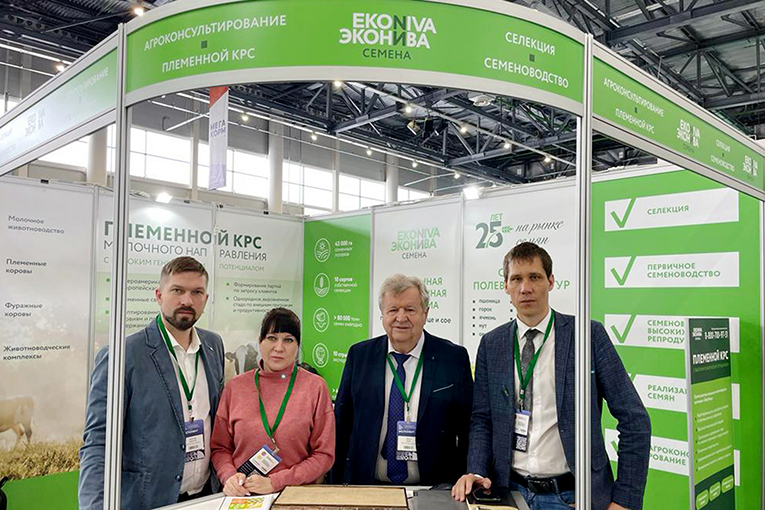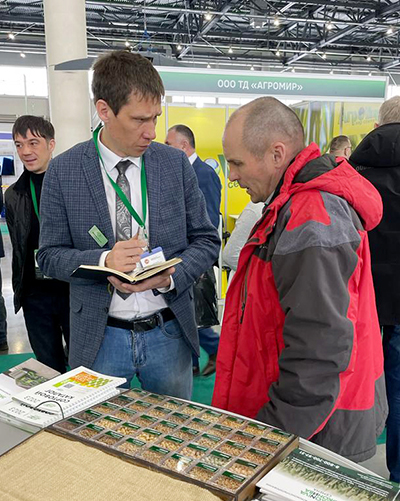EkoNiva boosts operations in Middle Volga
Press-centre / News,
EkoNiva has taken part in TatAgroExpo 2023, the 5th anniversary trade show of farming sector achievements. In Kazan, the company presented a wide range of staple crop seeds, including the in-house bred ones, and pedigree dairy cattle.

Over 370 companies from 35 regions of Russia as well as from Belarus and Kyrgyzstan showcased their booths on the area exceeding 35,000 m2 at Kazan Expo International Exhibition Centre. More than 10,000 agribusiness representatives attended the event. Compared to the last year, the number of participants almost doubled, and the premises were one and a half times bigger. TatAgroExpo covered all the segments of the farming sector demonstrating agricultural machinery and spare parts, seeds and cattle, plant protection agents and fertilisers, scientific developments and local farmers' products.
Shortly before the sowing season, both regular and potential customers seized the opportunity to discuss interesting offers and learn about novelties. Buzzing with activity all through the trade show, EkoNiva’s booth hosted about 50 business meetings.
‘At TatAgroExpo, the holding’s products were introduced not only to the local farmers, but also to the guests from the neighbouring regions: Samara, Ulyanovsk and Orenburg oblasts as well as Chuvashia, Bashkiria and Udmurtia. The Group has been supplying seeds to enterprises in Tatarstan and nearby areas for about eight years and is poised to further boost the sales. In the current season, we have already provided over 3,000 tonnes of winter and spring crop seeds to these regions’, says Yevgeniy Kucheryavenko, Executive Director of EkoNiva-Semena.
 Winter and spring wheat, spring barley, oats and peas are the top crops in the Middle Volga. The varieties which have proved themselves to deliver good yields under the local conditions are of particular interest to the agricultural producers. These are the winter wheat varieties Skipetr and Moskovskaya 56, spring wheat Licamero and barley Margret. Special priority is given to the regionally adapted varieties – the spring wheat Kanyuk, peas Rocket and Jackpot, barley Eifel and Laurikka. Among the varieties from the company's own breeding programme, the winter wheat adapted to the seventh region deserves attention – EN Taygeta and newcomers EN Voin and EN Perseus. They are distinguished by high winter hardiness and gluten quality.
Winter and spring wheat, spring barley, oats and peas are the top crops in the Middle Volga. The varieties which have proved themselves to deliver good yields under the local conditions are of particular interest to the agricultural producers. These are the winter wheat varieties Skipetr and Moskovskaya 56, spring wheat Licamero and barley Margret. Special priority is given to the regionally adapted varieties – the spring wheat Kanyuk, peas Rocket and Jackpot, barley Eifel and Laurikka. Among the varieties from the company's own breeding programme, the winter wheat adapted to the seventh region deserves attention – EN Taygeta and newcomers EN Voin and EN Perseus. They are distinguished by high winter hardiness and gluten quality.
‘Tatarstan is part of the seventh, Middle Volga, region. The sum of effective temperatures during the vegetation period here reaches only 2,000-2,200 degrees. It is quite a challenge to select varieties for this area. However, the winter wheat seeds which EkoNiva offers to the local farmers have the maximum cold resistance and survive at -18 °С at the tillering node (at the depth of 2-3 cm)’, emphasises Willi Drews, EkoNiva’s Consultant, Doctor of Agronomy.
In the Middle Volga region, soya bean cultivation has been actively developed recently. In this respect, the region made the top three in the country in 2022.
‘Today, prices on soya beans are much higher than for other crops. With that, many farmers have failed to get the desired yields because they opted for late maturing varieties. EkoNiva’s portfolio includes early maturing soya bean varieties: EN Argument (the very early maturity group, the sum of effective temperatures is 1,900 °С), EN Akcent (2,100 °С) and EN Argenta (2,200 °С) adapted to the Middle Volga weather conditions’, continues Willi Drews.
There is also a growing interest in oats, lentils, flax and forage grasses in the region. Of the latter, EkoNiva has alfalfa seeds with the highest quality values for protein and yield to offer.
At TatAgroExpo, the holding’s experts discussed issues relating to the Group’s dairy pedigree cattle breeding elaborating on the key features and advantages of this agribusiness area, as well as the cattle shipment terms. EkoNiva has been supplying pedigree heifers to the region for a relatively short time, just over a year. Many local breeders, however, have already had the chance to see the benefits of the cattle. According to their feedback, the milk yields of the fresh cows constitute 30-36 kg per day, with proper housing and feeding ensured.